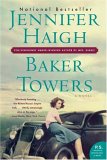Summary | Excerpt | Reading Guide | Reviews | Readalikes | Genres & Themes | Author Bio

Rose had resisted—quietly at first, then
loudly, without restraint. Georgie was a serious young man, a musician. He’d
taught himself the clarinet and saxophone; since the age of five he’d played
the violin. Besides that, he was delicate: as a child he’d had pneumonia, and
later diphtheria. Both times he had nearly died. If America wanted his precious
life, then America would have to call him. Rose would not let Stanley hand him
over on a plate.
For a time she had her way. Georgie graduated
high school and went to work at Baker One. He blew his saxophone in a dance band
that played the VFW dances Friday nights. When the draft notice came, Stanley
had seemed almost glad. Rose called him a brute, a braggart—willing to risk
Georgie’s life so he’d have something to boast about in the beer gardens. At
the time she believed it. The next morning she found him gathering eggs in the
henhouse, weeping like a baby.
He was strict with the children, with Georgie
especially. Only English was to be spoken at home; when Rose lapsed into Italian
with her mother or sisters, Stanley glared at her with silent scorn. Yet late at
night, once the children were in bed, he tuned the radio to a Polish station
from Pittsburgh and listened until it was time for work.
She left the warmth of the church and walked home
through a stiff wind, wisps of snow swirling around her ankles, hovering above
the sidewalk like steam or spirits. The sky had begun to lighten; the frozen
ground was still bare. Good for the miners, loading the night’s coal onto
railroad cars; good for the children, who walked two miles each way to school.
At Polish Hill the sidewalk ended. She continued
along the rocky path, hugging her coat around her, a fierce wind at her back.
Ahead, a group of miners trudged up the hill with their empty dinner buckets,
cupping cigarettes in their grimy hands. They joked loudly in Polish and
English: deep voices, phlegmy laughter. Like Stanley they’d worked Hoot Owl,
midnight to eight; since the war had started the mines never stopped. Rose
picked out her neighbor Andy Yurkovich, the bad-tempered father of two-year-old
twins. He had a young Hungarian wife; by noon her nerves would be shattered,
trying to keep the babies quiet so Andy could sleep.
Rose climbed the stairs to the porch. The house
was warm inside; someone had stoked the furnace. She left her shoes at the door.
Dorothy sat at the kitchen table chewing her fingernails. The baby sat calmly in
her lap, mouthing a saltine cracker.
"Sorry I’m late. That Polish priest, he
need an alarm clock." Rose reached for the baby. "Did she behave
herself?" she asked in Italian.
"She was an angel," Dorothy answered in
English. "Daddy’s home," she added in a whisper. She reached for her
boots and glanced at the mirror that hung beside the door. Her hair looked
flattened on one side. An odd rash had appeared on her cheek. She would be
nineteen that spring.
"Put on some lipstick," Rose suggested.
"No time," Dorothy called over her
shoulder.
In the distance the factory whistle blew. Through
the kitchen window Rose watched Dorothy hurry down the hill, the hem of her
dress peeking beneath her coat. People said they looked alike, and their
features—the dark eyes, the full mouth—were indeed similar. In her high
school graduation photo, taken the previous spring, Dorothy was as stunning as
any movie actress. In actual life she was less attractive. Tall and
round-shouldered, with no bosom to speak of; no matter how Rose hemmed them,
Dorothy’s skirts dipped an inch lower on the left side. Help existed: corsets,
cosmetics, the innocent adornments most girls discovered at puberty and used
faithfully until death. Dorothy either didn’t know about them or didn’t
care. She still hadn’t mastered the art of setting her hair, a skill other
girls seemed to possess intuitively.
The foregoing is excerpted from Baker Towers by Jennifer Haigh. All rights reserved. No part of this book may be used or reproduced without written permission from HarperCollins Publishers, 10 East 53rd Street , New York , NY 10022
Your guide toexceptional books
BookBrowse seeks out and recommends the best in contemporary fiction and nonfiction—books that not only engage and entertain but also deepen our understanding of ourselves and the world around us.